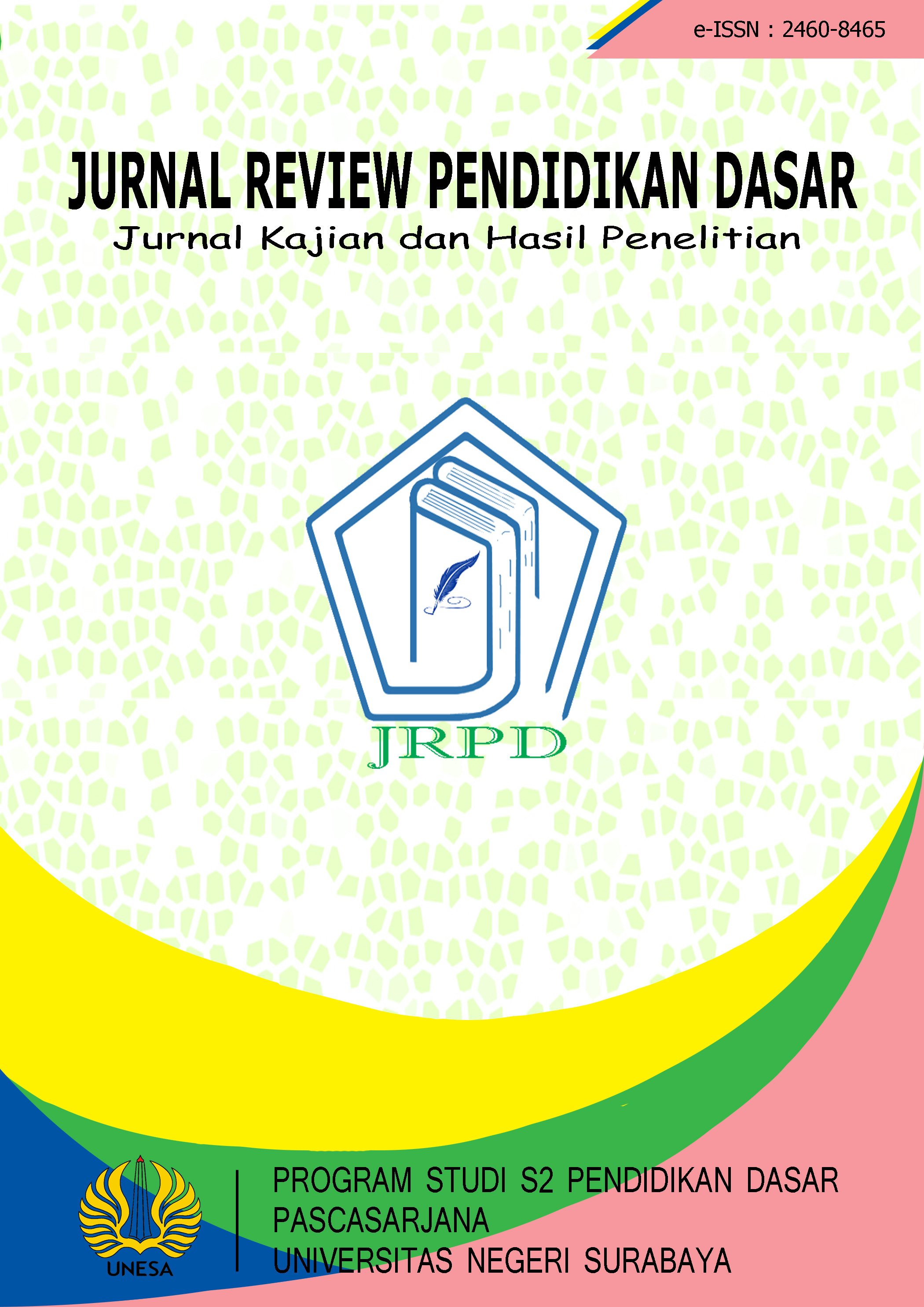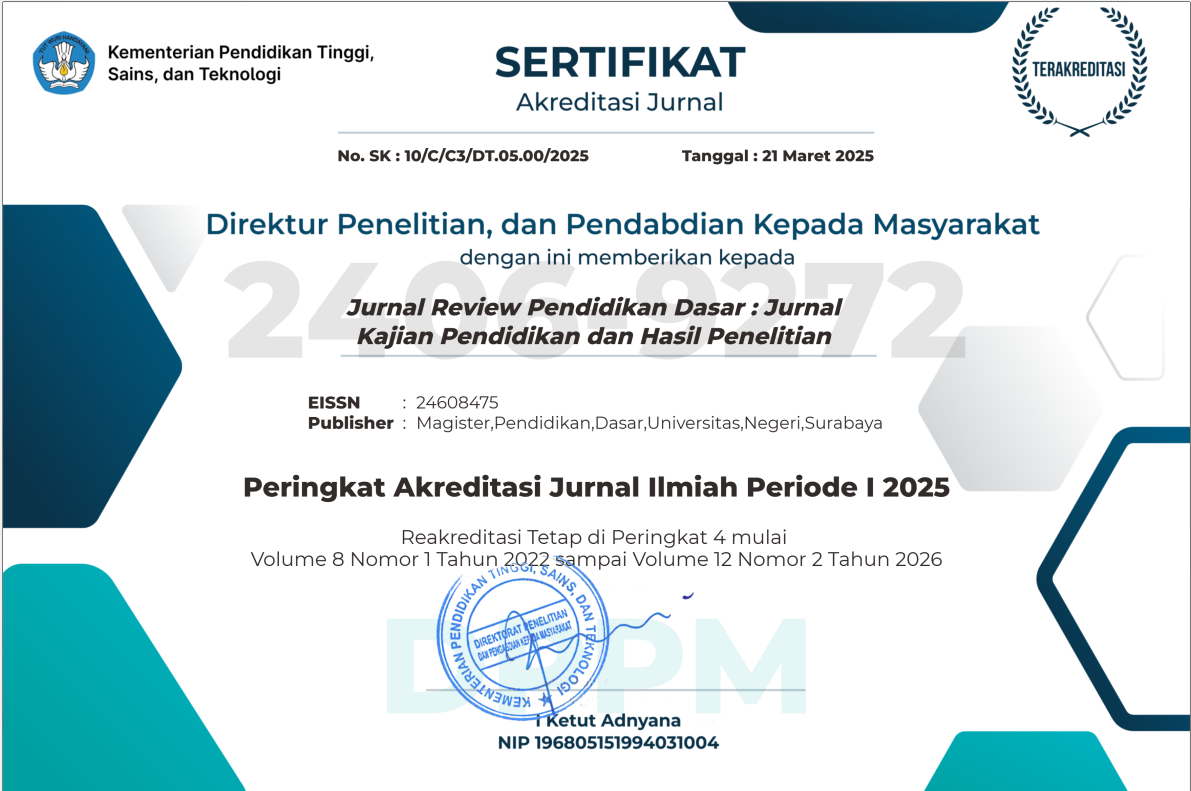PENGARUH MODEL PEMBELAJARAN KOOPERATIF TIPE TALKING CHIPS TERHADAP KETERAMPILAN SOSIAL DAN HASIL BELAJAR IPS SISWA KELAS IV SEKOLAH DASAR
DOI:
https://doi.org/10.26740/jrpd.v5n1.p868-874Abstract
ABSTRACT
The aims of this research is to know the effect of cooperative learning model of talking chips to social skill fourth grade student of Elementary School and to know the effect of cooperative learning model of talking chips to learning outcomes of Social Studies fourth grade student of Elementary School. The subject of this research is fourth grade student in SDN Kedungsumur I as control class and fourth grade student in SDN Kedungsumur III as experiment class school year 2015/2016. In this research using quasi experimental design with form of research is nonequivalent control group design. The research data was obtained as follows: social skills of student in pretest at experiment class there is nothing different with control class. This condition was shown with thitungscore (0.613) < ttabel (1.686) with mean score in experiment class is 58.3500 in control class 57.0500. While social skills of student in posttest at experiment class there is different with control class. This condition was shown with thitungscore (14.081) > ttabel (1.686) with mean score in experiment class is 86.5500 and in control class 63.3500. So, there are effect of the cooperative learning model of talking chips to social skills of student. After that for second hypothesis testing was showed that student learning outcomes in pretest at experiment class there is nothing different with control class. This condition was shown with thitung score (0.968) < ttabel (1.686) with mean score in experiment class is 60.7000 and in control class is 57.3500. While student learning outcomes in posttest at experiment class there is different with control class. This condition was shown with thitungscore (6.798) > ttabel (1.686) with mean score in experiment class is 89.6500 and in control class 74.1000. So, there are effect of cooperative learning model of talking chips to student learning outcomes.Based on the result of analyze data, it can be concluded that cooperative learning model of talking chips has an effect to student social skills and student learning outcomes in significant.
Keyword: Talking Chips, Social Skill, Learning Outcomes.
ABSTRAK
Tujuan penelitian ini adalah untuk menganalisis pengaruh model pembelajaran kooperatif tipe talking chips terhadap keterampilan sosial siswa kelas IV Sekolah Dasar dan untuk menganalisis pengaruh model pembelajaran kooperatif tipe talking chips terhadap hasil belajar IPS siswa kelas IV Sekolah Dasar. Subjek dalam penelitian ini adalah siswa kelas IV SDN Kedungsumur I sebagai kelas kontrol dan IV SDN Kedungsumur III sebagai kelas eksperimen tahun pelajaran 2015/2016. Dalam penelitian ini menggunakan quasi experimental design dengan bentuk desain penelitian nonequivalent control group design. Data hasil penelitian yang diperoleh sebagai berikut: keterampilan sosial siswa pada saat pretest di kelas eksperimen tidak ada perbedaan dengan kelas kontrol. Hal ini ditunjukkan dengan nilai thitung(0.613) < ttabel (1.686) dengan nilai mean pada kelas eksperimen sebesar 58.3500 dan pada kelas kontrol sebesar 57.0500. Sedangkan keterampilan sosial siswa pada saat posttest di kelas eksperimen ada perbedaan dengan kelas kontrol. Hal ini ditunjukkan dengan nilai thitung(14.081) > ttabel (1.686) dengan nilai mean pada kelas eksperimen sebesar 86.5500 dan pada kelas kontrol sebesar 63.3500. Jadi, ada pengaruh model pembelajaran kooperatif tipe talking chips terhadap keterampilan sosial siswa. Kemudian untuk pengujian hipotesis kedua menunjukkan bahwa hasil belajar siswa pada saat pretest di kelas eksperimen tidak ada perbedaan dengan kelas kontrol. Hal ini ditunjukkan dengan nilai thitung(0.968) < ttabel (1.686) dengan nilai mean pada kelas eksperimen sebesar 60.7000 dan pada kelas kontrol yaitu 57.3500. Sedangkan hasil belajar siswa pada saat posttest di kelas eksperimen ada perbedaan dengan kelas kontrol. Hal ini ditunjukkan dengan nilai thitung(6.798) > ttabel (1.686) dengan nilai mean pada kelas eksperimen sebesar 89.6500 dan pada kelas kontrol sebesar 74.1000. Jadi, ada pengaruh model pembelajaran kooperatif tipe talking chips terhadap hasil belajar siswa. Berdasarkan hasil analisis data, dapat disimpulkan bahwa model pembelajaran kooperatif tipe talking chips berpengaruh terhadap keterampilan sosial siswa dan hasil belajar siswa secara signifikan.
Kata Kunci: Talking Chips, Keterampilan Sosial, Hasil Belajar.
Fathurrohman, Muhammad. (2015). Model-Model Pembelajaran Inovatif: Alternatif Desain Pembelajaran yang Menyenangkan. Jogjakarta: Ar-Ruzz Media.
Gillies, Robyn M, dkk. (2008). The Teachers Role in Implementing Cooperative Learning in the Classroom. USA: Springer Science.
Gregoriadis, Athanasios, dkk. (2013). Evaluating Preschooles Social Skills: The Impact of a Physical Education Program from the Parents Perspective. International Journal of Humanities and Social Science.Vol. 3 No. 10, pp. 40-51.
Huda, Miftahul. (2012). Cooperative Learning; Metode, Teknik, Struktur dan Model Terapan. Yogyakarta: Pustaka Pelajar.
Imron, Ilmawati Fahmi. (2014). Pengaruh Penerapan Pendekatan Scientific dengan Model Pembelajaran Berbasis Masalah terhadap Berpikir Kritis dan Keterampilan Sosial Siswa Materi Manusia dan Lingkungannya di Sekolah Dasar (Tesis tidak dipublikasikan). Universitas Negeri Surabaya.
Isjoni. (2013). Cooperative Learning. Pekanbaru: Alfabeta.
Jihad, Asep dan Abdul Haris. (2012). Evaluasi Pembelajaran. Yogyakarta: Multi Pressindo.
Kunandar. (2014). Penilaian Autentik (Penilaian Hasil Belajar Peserta Didik Berdasarkan Kurikulum 2013). Jakarta: Rajawali Pers.
Kurniawan, Deni. (2014). Pembelajaran Terpadu Tematik (Teori, Praktik, dan Penilaian). Bandung: Alfabeta.
Lie, Anita. (2008). Cooperative Learning (Mempraktikkan Cooperative Learning di Ruang-ruang Kelas). Jakarta: PT. Grasindo.
Sapriya. (2009). Pendidikan IPS Konsep dan Pembelajaran. Bandung: PT. Rosda Karya.
Subroto, Waspodo Tjipto. (2014). Bahan Pembelajaran Ilmu Pengetahuan Sosial di Sekolah Dasar. Surabaya: Unesa University Press.
Sugiyono. (2013). Metode Penelitian Pendidikan Pendekatan Kuantitatif, Kualitatif, dan R&D. Bandung: Alfabeta.
Yeo, Kee Jiar dan Kie Yin Teng. (2015). Social Skills Deficits in Autism: A Study among Students with Autism Spectrum Disorder in Inclusive Classrooms. Universal Journal of Educational Research. Vol. 3 No.12, pp. 1001-1007.References
Fathurrohman, Muhammad. (2015). Model-Model Pembelajaran Inovatif: Alternatif Desain Pembelajaran yang Menyenangkan. Jogjakarta: Ar-Ruzz Media.
Gillies, Robyn M, dkk. (2008). The Teachers Role in Implementing Cooperative Learning in the Classroom. USA: Springer Science.
Gregoriadis, Athanasios, dkk. (2013). Evaluating Preschooles Social Skills: The Impact of a Physical Education Program from the Parents Perspective. International Journal of Humanities and Social Science.Vol. 3 No. 10, pp. 40-51.
Huda, Miftahul. (2012). Cooperative Learning; Metode, Teknik, Struktur dan Model Terapan. Yogyakarta: Pustaka Pelajar.
Imron, Ilmawati Fahmi. (2014). Pengaruh Penerapan Pendekatan Scientific dengan Model Pembelajaran Berbasis Masalah terhadap Berpikir Kritis dan Keterampilan Sosial Siswa Materi Manusia dan Lingkungannya di Sekolah Dasar (Tesis tidak dipublikasikan). Universitas Negeri Surabaya.
Isjoni. (2013). Cooperative Learning. Pekanbaru: Alfabeta.
Jihad, Asep dan Abdul Haris. (2012). Evaluasi Pembelajaran. Yogyakarta: Multi Pressindo.
Kunandar. (2014). Penilaian Autentik (Penilaian Hasil Belajar Peserta Didik Berdasarkan Kurikulum 2013). Jakarta: Rajawali Pers.
Kurniawan, Deni. (2014). Pembelajaran Terpadu Tematik (Teori, Praktik, dan Penilaian). Bandung: Alfabeta.
Lie, Anita. (2008). Cooperative Learning (Mempraktikkan Cooperative Learning di Ruang-ruang Kelas). Jakarta: PT. Grasindo.
Sapriya. (2009). Pendidikan IPS Konsep dan Pembelajaran. Bandung: PT. Rosda Karya.
Subroto, Waspodo Tjipto. (2014). Bahan Pembelajaran Ilmu Pengetahuan Sosial di Sekolah Dasar. Surabaya: Unesa University Press.
Sugiyono. (2013). Metode Penelitian Pendidikan Pendekatan Kuantitatif, Kualitatif, dan R&D. Bandung: Alfabeta.
Yeo, Kee Jiar dan Kie Yin Teng. (2015). Social Skills Deficits in Autism: A Study among Students with Autism Spectrum Disorder in Inclusive Classrooms. Universal Journal of Educational Research. Vol. 3 No.12, pp. 1001-1007.
Downloads
Published
How to Cite
Issue
Section
 Abstract views: 1487
,
Abstract views: 1487
, PDF Downloads: 1216
PDF Downloads: 1216




